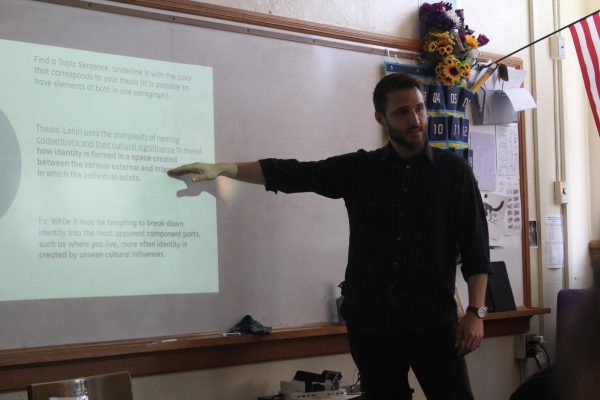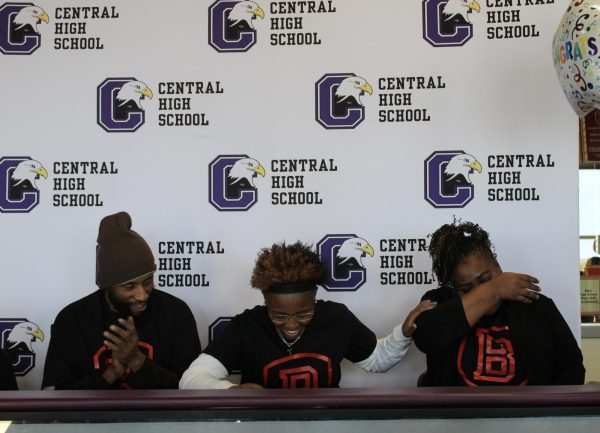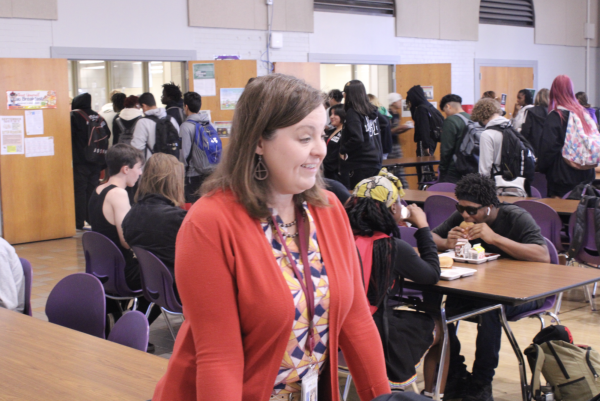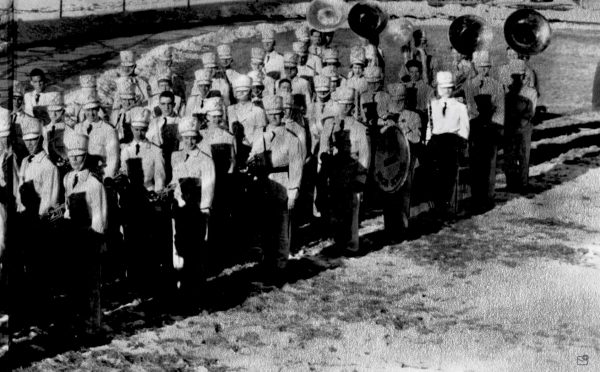Bike Union offers more than just a job
The ‘flying saucer’ on 18th and Dodge is an oddly shaped building. The space has lived many lives in the past, opening originally as a credit union. The architect of this building was John Latenser III, a grandchild of John Latenser Sr., the architect of Central High School. The building was designed to look like the helmet of Mercury, the Roman God of finance and war. Since 2015, this building has been inhabited by the nonprofit social enterprise, the Bike Union.
Miah Sommer, an Omaha native, started the Bike Union to support young adults who have aged out of the foster care system. “When you’re a little kid, I think that the city and state or whatever, they look out for [your needs]. But when you’re older, nearly an adult, or even an adult, that is when you can really fall through the cracks. That is why we serve adults who have been impacted by the foster care system because there’s really no system, they’re out of the foster care system so how do you keep people from making bad decisions,” Sommer explained.
A 2017 study from the Children and Youth Services Review, a journal dedicated to covering the study of social service programs pertaining to children, reported that a staggering 20 percent of kids who age out of the foster care system are immediately homeless or “inadequately housed” according to the study. An additional 30 percent of the youth experience at least one night of homelessness, and in a representative sample of kids who have aged out of the foster care system in California, one-third of the youth experienced homelessness, and another 40 percent “couch surfed.”
Sommer said that there are a whole host of issues that occur when youth age out of the foster care system. “Obviously, we are not going to fix all those things, you’re not going to change the world on that, but like, if we could take care of the workforce development part, that was the big thing for us. If you could give somebody a job and then kind of help them stay where they needed to be on that job, I feel like you take care of a lot of things by doing that,” Sommer explained. “If you are trying to help somebody with like, say like, prison reentry or something like that, the job becomes so important and if they lose the job then everything kind of crumbles. For us it really helped to say we provide that job, and then we’re going to take care of all that infrastructure around that.”
The infrastructure that Sommer refers to is one of the most special pieces about the Bike Union. Not only do they provide a job and training for that job, but they provide many extra programs for employees of the Bike Union. “In addition to the workforce development program, we do financial literacy classes, we do nutrition classes, we do mindfulness and meditation classes, all that stuff is happening as well,” Sommer said.
The typical nuclear family would provide a lot of these resources generally, which is why the Bike Union offers them, Sommer explained. “Sometimes I just like to think of things that maybe a nuclear family would do for you that aren’t really happening for you in your life. When I was 19-20 years old, I could have used this commonsense approach to things like ‘Hey! You should know how to do this’ or ‘You should know how to do that’ and so that was what was lacking in my life, and I wanted to make sure that we could provide that,” Sommer said. “And also, just like, as far as mindfulness and meditation goes, everyone needs that emotional intelligence. It’s just as much of an important part of working here as the technical skills. My parents didn’t provide that for me, and most of the time, their families didn’t provide that for them.”
Sommer explained how events in his life led to him starting the Bike Union. “I grew up with a lot of background trauma. Food shortage, high school dropout, things like that,” Sommer said. “It’s interesting to try and think of, you know, after getting past all that, thinking of things that I could have used at that time.”
Sommer also explained how the employees at the Bike Union are allowed to make mistakes. “I think the big thing is that it meets people where they are at and what they’re bringing to the table. You don’t expect somebody to just knock it out of the park right away, you’re going to find what they’re weaknesses and strengths are as people and you’re going to play to that. With a normal job, if you’re tardy in the first week or on the first day, you’re going to lose your job,” Sommer said. “That doesn’t really happen at the Bike Union. You get a chance to make your mistakes, to learn from the mistakes.”
For seven years, The Bike Union has been a joint bike-coffee shop. Sommer says that that is about to change. “The bike industry was where I was at professionally. I had already been in the bike industry for 10 years at that point, I needed some sort of vehicle to provide the social enterprise organization. Bikes were the business I knew, that was what I did. The coffee shop was really an afterthought. Once we got this location, it’s such a prime location, we were like, this needs to be a coffee shop. What we’ve found is like, as the business exists, this coffee shop is a really fun way to have this joint project with the young adults we serve. The bike side, however, is such an esoteric hobby as it is, and then the skill is so hard to come by. You can be making coffee and be completely proficient in six weeks. Six months into the bike shop, I feel like you just start to understand what’s going on. We’ve come to the decision recently that we are going to close the bike shop down. The coffee shop is where it’s at. We’re rebranding as a whole coffee shop, we’re changing our name, and we’re opening a second location at the Atlas apartment buildings.”
Central is the largest high school in Nebraska, housing over 2,600 kids. Sommer says that having a business near Central has been wonderful. “There was a fire drill earlier, that we got a lot of customers from. We were like ‘What is going on?’ and someone replied ‘There’s a fire drill!’ It has a really positive impact; we get so much business from there. There’s a good connection with the kids who come here. Years ago, we had problems, but now we have very little problems. Kids come here, they do their homework, they’re not causing trouble, they’re respectful. It’s fun. It’s a big part of our business. Come the end of May when Central is done, you can definitely see a slight dip in sales and foot traffic, so it is nice to have that, but I do think that the interesting part of the story is that a lot of it is people who aren’t supposed to be here during the day,” Sommer says. “We don’t want to tell the higher ups that we’re funded by truancy. At 3:15, you’re gonna get a little rush. I might call in some fire drills, who knows,” Sommer joked. “It’s good for business.”
Sommer says that the Bike Union is a rare form of nonprofit. “I am the executive director of a nonprofit, I think that one, it’s a very uncommon nonprofit and two, I am a very uncommon executive director because I’m generally pretty hands on,” Sommer says. “I want to be with the people. I always like to mention that this is such a great way to have them figure out who they want to be, what they want to be, but it’s not this charity or this hand down thing. It’s just them figuring out who they want to be. The saying is always that we’re the dirt, they’re the flowers. Whatever they want to accomplish, they accomplish because they’re in an environment that fosters that. I’m not better than them, and they prove time and again that they’re more resilient and better than me.”
Your donation will support the student journalists of Omaha Central High School. Your contribution will allow us to purchase equipment and cover our annual website hosting costs.
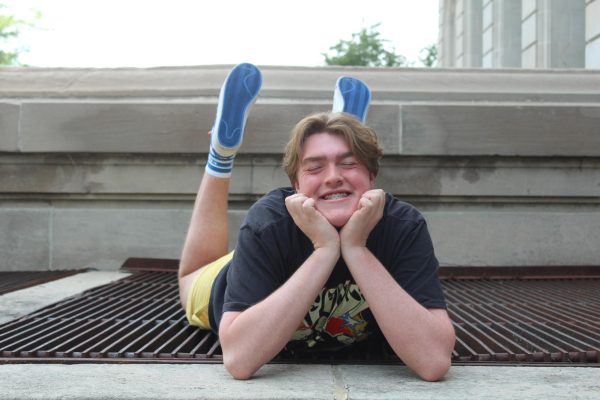
Hi! My name is Charlie (he/him), and I'm a senior. This is my fourth (and final </3) year on staff, and I’m the Co-Editor-in-Chief. I was voted most...













